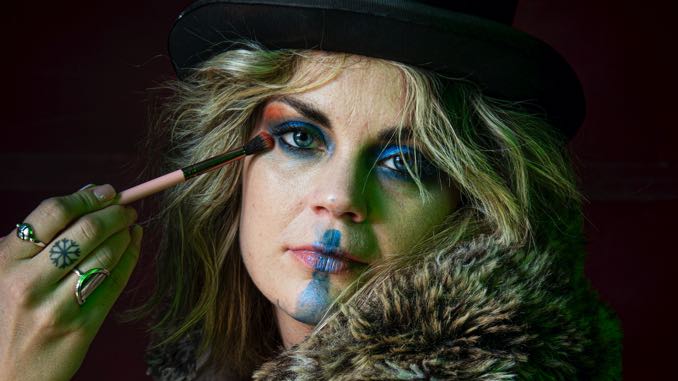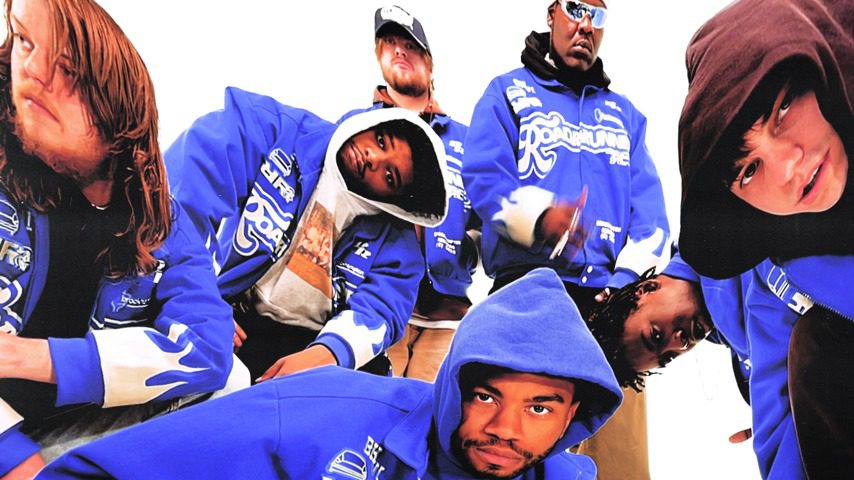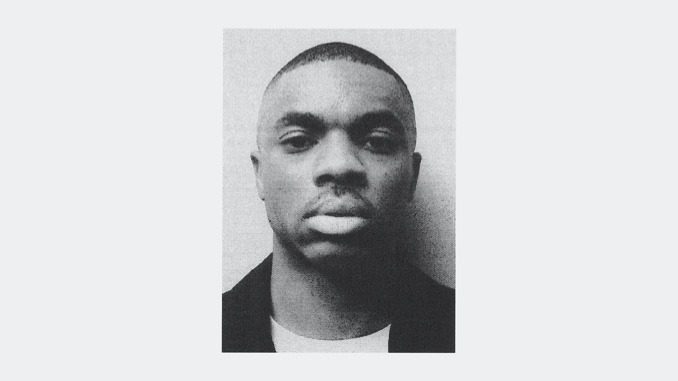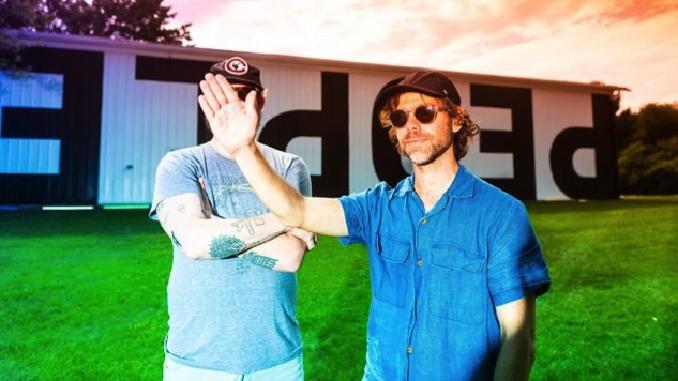Like many Netflix viewers around the world, Norwegian rock diva Ida Maria fell in love with what proved to be the perfect pandemic panacea, the brilliant, razor-sharp comedy Eurovision Song Contest—The Story of Fire Saga, concerning a hapless Icelandic musical duo from the tiny, idyllic seaside town of Husavik. But her favorite scene happens early on, when Lars and Sigrit (played with wickedly understated precision by Will Ferrell and Rachel McAdams, respectively) are standing on a pier, discussing where the middle-aged Lars will move now that his father (an even more restrained Pierce Brosnan) is kicking him out of the family home. “At least it will be in our beautiful Husavik!” Sigrit enthuses, while two gray whales breach and pirouette in tandem right in front of them. To which her bandmate yawns, shrugs, and sighs, “Yeah … I guess so … ”
“I just watched Fire Saga again last night, and Husavik is very comparable to my village,” snickers Maria, phoning from her own mountainous birthplace, Nesna, where she returned and has permanently resided since disgustedly walking away from the big-league music industry in 2013. “And in watching that movie, I recognized myself in those two people—they’re just trying to make something good in the world, and my hometown is just like theirs—you can’t really see its beauty until you get some distance from it.” But once you boomerang back, she adds, you can finally appreciate its subtle splendors, “like when the whales are jumping in a synchronized dance—it can really feel exactly like that up here.”
Maria broke worldwide back in 2008 with her punk-pop hit debut Fortress Round My Heart and memorable, slamming singles such as “Oh My God,” “Queen of the World” and the blunt “I Like You So Much Better When You’re Naked.” And she had a rare slant on songwriting shared by Britain’s Marina Diamandis—a condition known as synesthesia, wherein she doesn’t hear notes tonally, but intuits them as colors instead. She used to view it as a negative; now, it’s a great aesthetic asset. Which might account for the surprise violet, velvet turn she took on her last album, Scandalize My Name, a stark, straightforward set of vintage American spiritual covers. Or the black-and-blue brutal about-face of her brand new EP Dirty Money, bristling with punk-retro headbangers like “California,” “I’m Busy,” “Sick of You” and the sneering title track, with a video that features her motorbiking around her rugged but scenic Nesna; she’s right—there is a distinct resemblance to Husavik, whose theme song was actually nominated for an Academy Award this year. It’s certainly someplace special.
If you were visiting, Maria has a roster of outdoorsy activities—ocean kayaking, mountain climbing, cave diving, with an array of hip eateries serving locally sourced vegetables, plus the obligatory cod, haddock and reindeer. She and her five-year-old son Magnus have sampled it all, she says, “and it really is a nature paradise. But in the winter time? This is no place for pussies—it’s for Arctic explorers only, and sometimes the storms are so crazy I feel like I’m just gonna blow away into the ocean. But I’ve survived.” And thrived—Dirty Money is her best work yet, and her seasoned, old-school rock and roll rasp is quite a force to behold, commensurate with her latest coup—starring in, and composing songs for, her first Norwegian action-adventure flick. And of course, she’s had her own brushes with real-life Eurovision stardom …
Paste: So you’re into farming now?
Ida Maria: Yeah—I’m growing potatoes. This year, I’m not going to be able to do it in my garden. I bought some land and a house, so I’m just doing it in my friend’s garden this year. But my son and my ex—my son’s father—he’s working on a big organic farm out here. So I’m just doing small-scale home farming. And what I’m doing is potatoes because I’m obsessed with potatoes. So I have three kinds now that I’m growing on my kitchen table, and my friends think I’m crazy. My friend came over the other day, and he thought my kitchen was so messy, so he started cleaning it. And then he comes back and I have the table full of potatoes, and he’s like, “I can’t help you—you’re hopeless! You’re supposed to eat breakfast there, but you’re growing potatoes in your kitchen!” So right now I’m just growing them on the table, because you have to light-grow them for a couple of days, and this is springtime so it’s really good to let them out of their paper and let them start to sprout on the table. So I had my boyfriend over, and we went for a walk, and I was like, “Can we just stop by this place? I’m going to get some horse shit.” And he said, “No fucking way! We’re not going to get fertilizer while we’re on this romantic walk!” But there was a farmer right there, and he had horses, so I was just going to check with him, really. Because that’s just the best for potatoes—horse shit. Lots of people say chicken shit, but that’s not good for potatoes—horse shit has a good acid balance. So I’m not a farmer, per se—I just dabble.
Paste: Given your great sense of humor, as in early hits like “I Like You So Much Better When You’re Naked,” I think people might occasionally underestimate just how serious you are about your music. Because your last 2016 album, Scandalize My Name was dead-serious American gospel.
Maria: Thank you very much. I couldn’t release anything because I was still signed to a label, so I only had the opportunity to release something that I hadn’t written myself. And I was pregnant, I was going to have a child, so I wanted something child-friendly to tour with, you know? So that material explained in the best words what I felt like we were all going through, collectively going through—some kind of enslavement situation right now, on so many levels. And the refugee crisis in Europe was very much a big news story at the time—it was horrible, horrible news. And at the same time, we had the terrorism propaganda, so for me that was a huge creative catharsis. I couldn’t release my rock music, I couldn’t release any of the songs I was doing. So I just got a release through that music, and then [the imprint] dumped me when I was pregnant—all good, all good! And then I was finally ready to release my own songs.
Paste: An interesting footnote on that—when Elvis came back from the Army in the wake of The Beatles and the British Invasion, he wasn’t sure how to respond. So he just doubled down on what he did best and made a gospel album, How Great Thou Art.
Maria: Yeah. That album is opening doors for me in Lagos, Nigeria. Right now, I’m working with a producer in Lagos, just for fun—we’re just having fun right now—but I’m working with people in the States, too, more on the hip-hop side of things. Because they recognized what I did there, and it’s opening doors for me now that I really wanted to open. I’ve been working in the, let’s say, the white, white music business and touring the Western world. But I grew up with Stevie Wonder and R&B and soul and jazz and blues, and I always think that you can hear that in my music. But I never really showed any of those sides of me, so I’m trying to marry all my influences at this point, if I can.
Paste: Your new song “I’m Busy” is leaning in that direction.
Maria: Yeah, with a little bit of soul. There’s just like a little bit of soul, just a touch, here and there. But I’m much more curious about that sound than that.
Paste: But these five songs are just classic punk rock. And you get it—CBGB’s, Max’s Kansas City, Sire Records, everything that was happening back in ’77.
Maria: Yeah. And for me, rock music is a valid format that I like, you know? I’m very comfortable there, and it’s still working. So that’s why I’m recharging my music, and doing these other things. And I think getting free [of the last contract] made me able to express myself properly—I wasn’t motivated before. But now I am, because I’d always been dreaming of having this direct contact with my audience, but I’ve always had this major label in between, and so many chefs in the kitchen. I know what I want, and I love to make music—there’s nothing else that I prefer to do, except maybe sometimes plant potatoes and tend to my trees. And of course, my son is amazing—he’s an amazing part of my life. But music was something I chose early. I thought, “This is the career that I can grow old in—this is what I wanna do!” I’m 36 now, and I’ve been able to make a living from this since I started. And I had one real job recently, as a city adviser on the cultural activities for young people. It was an actual real job, and it was difficult for me. It was difficult administratively, because I work in a different way. So I had to learn a new way of working, and it wasn’t an intuitive way to work—it was very law-based, while punk rock is about breaking the law, right? Or let’s say punk rock is about challenging the status quo, or the given order of the time. So this was about working within, and that’s a whole other way of thinking.
Paste: Did you have to go into an office?
Maria: Oh yeah. And that was my big problem—my office was square, and I was immediately thinking about soundproofing it. I was like, “These corners need to go.!” But then I realized that yeah, that is an office space, so it didn’t really need soundproofing. But it could have used it, and it would have been nice. But I just think in a different way, you know? I even got into politics, but I’m pulling out—I just withdrew from the Parliament election, because now I just want to be creative, full time. And it’s pretty challenging, too, to combine those two ways of thinking. One’s very formal, and the other very free and expressive. So I’m withdrawing now from politics. But I had a few impulsive singing meetings in the city hall there—I’d invite all the bosses to join in on a good old-fashioned singalong in the middle of the workday.
Paste: Maybe it was the gospel album. But don’t you think your singing voice is so much more seasoned, confident and aggressive now?
Maria: Yes. And that’s why I’m doing a jazz band now, which is just a hobby—that’s one thing that I do with some friends, because I really need to use this voice, and how it’s developing now. I’ve put the whiskey aside, but life has been lived, you know? What can I say? So I just gathered a group of friends, and we made this band, and we’re trying to break some ground here, locally. We’re doing Mac Miller covers, and Billie Holiday—we’re doing what we think is fun, and we’re trying to challenge ourselves with the best soul/R&B hits from back in the day, along with some spirituals.
Paste: Speaking of Fire Saga, didn’t you have a Eurovision near-miss in 2018 when your song “Scandilove” made it to the finals of Norway’s qualifying Melodi Grand Prix?
Maria: That was just for fun. But the year before, I gave another song called “Pussy” to another artist, and she performed it, and that’s how I got entangled into the world of Eurovision. And I had always kept it at arm’s length, but I thought, “What the heck? You’ve got to try everything once, right? Sure!” So I dressed in a crazy costume and kind of fumbled my way through, but I had such a bad flu the day before that I almost canceled. So I told myself, “I have to just do this,” you know? So it was what it was.
Paste: Do you feel totally reinvigorated now with this new material?
Maria: Yeah. I feel like that—I really do. I see what my songs can do with just me singing them to an audience, uncensored. And right now, of course, I’m censoring some songs—I’ve had to change some words for the American radio stations, because I have a very bad habit of swearing in my songs. But I come from a fishermen’s village, and this is literally how we communicate. It’s like, “Fuck this! Fuck that!” Because they fly very well through stormy weather—that’s my experience. And swear words have heavy consonants, so that’s also good for songwriting—if you really need some rhythmic words, swear words are great for that. But in a sense, I think that should also represent how people do speak, you know?
Paste: Now that you’re off the major label, how are you releasing your music?
Maria: I have my own label, Nesna Records, named after my hometown. We released a few vinyls there at the start. So yeah, now I’m back to that, and I have a distribution deal with Symphonic Distribution, and they are fantastic, and I have a separate publishing deal. So now I just do basically whatever I want. So you can do a lot of things by yourself, and right now, I’m experiencing releasing music for the first time remotely, from my home, with distribution worldwide and publicists from somewhere else, as well. And we all do our meetings online—we’ve never met, and we’re just working remotely. Everything is remote. There was one song, “I’m Busy,” where I had to re-do the vocals, so I had to go and do them here, during Covid lockdown. But it worked—it’s fine.
Paste: How did lockdown affect you?
Maria: What I experienced was that I’ve moved to a place on the planet that is quite remote, with a view that’s kind of outside the world. But when Covid hit, we became the most attractive place, and everything turned upside down. Suddenly people were running from the cities, and we were so lucky to have all this space and all this nature, because in Oslo we could see people walking on top of each other, trying to go hiking in the same lane, trying to stay away from Covid but still doing something to entertain themselves. But we had all the ocean, all of the mountains, all of this space, and we had no huge international airports nearby so no Covid came up here. We could live in peace, and meet, and kind of take it easy. So we were able to live more normally. But in the summer we saw all the tourists coming up here with their camping trailers, just panic-traveling with their families on holiday. You couldn’t go outside the country, so everybody came north. And I bought a cheap caravan and put it in my garden, and I was camping in my garden. I thought, “Well, this is where everybody wants to go now, so I’d better appreciate what I have here!”




